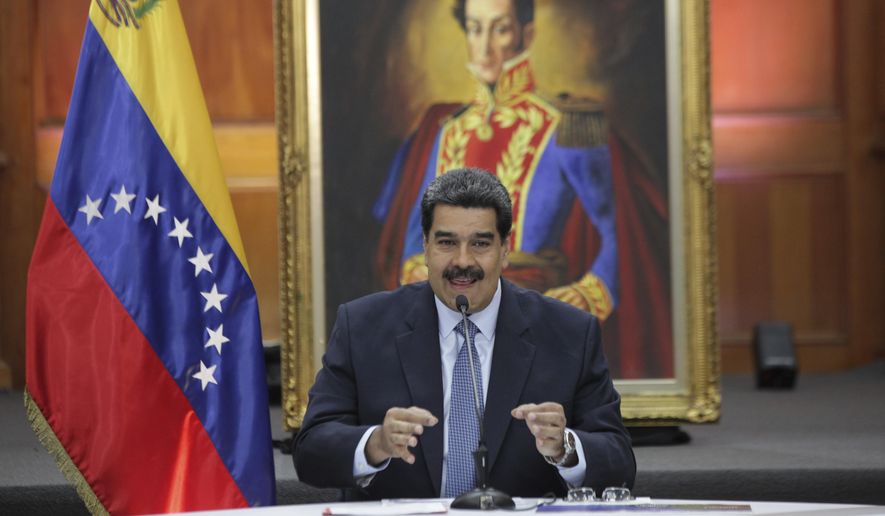CARACAS, Venezuela (AP) — Venezuelan President Nicolas Maduro was being sworn in to a second term Thursday amid international calls for him to step down and a devastating economic crisis, but with some long-time friends in attendance both from abroad and at home.
A dozen Latin American governments and Canada in a coalition have rejected the legitimacy of Maduro’s next term, and Washington has sanctioned top officials in his government.
But Cuba’s President Miguel Diaz-Canel and Bolivian President Evo Morales were among the foreign leaders who attended the ceremony at the country’s Supreme Court.
And while Maduro’s popularity has plunged amid scarcities, hyperinflation and rising authoritarianism that have sparked a mass emigration, supporters who receive government subsidies in shantytowns continue to back the man who took over for the late Hugo Chavez.
“It’s not the president’s fault,” said Frances Velazquez, a 43-year-old mother of two who survives on government-subsidized boxes of rice, flour and cooking oil. Velazquez blamed opportunists who drive up the prices on scarce items making life difficult for families like hers.
Others, like construction worker Ramon Bermudez, have lost hope of escaping Maduro’s rule and planned on hunkering down at home for the inauguration.
“All that’s left to do is raise your hand to heaven and ask God to help us,” said Bermudez, camped out on a Caracas sidewalk with hundreds of others waiting for gas. “There’s nothing more.”
Residents of Caracas awoke Thursday to unusually quiet streets but with a noticeably increased security presence and armed checkpoints.
State TV showed Maduro arriving at the Supreme Court where he is taking the oath of office. Several hundred supporters inside lining terraces of the building’s courtyard waving small flags and cheering.
Maduro’s second term will extend Venezuela’s socialist revolution amid widespread complaints that he has stripped Venezuela of its last vestiges of democracy.
Maduro denies that he’s a dictator and often blames President Donald Trump of leading an economic war against Venezuela that’s destroying the country.
“Not before, not now, nor will there ever be a dictatorship in Venezuela,” Maduro said in a Wednesday news conference.
Bermudez, 52, disagrees and points out the irony of living in a nation with the world’s most abundant oil reserves yet having to wait in line overnight recently to fill three canisters of natural gas to cook at home.
Oil-rich Venezuela was once among Latin America’s wealthiest nations. It produced 3.5 million barrels of crude daily when Chavez took power. Output now has plummeted to less than a third of that. Critics blame years of rampant corruption and mismanagement of the state-run oil firm PDVSA.
The economic collapse has left the nation of roughly 30 million in the throes of a historic crisis.
An estimated 2.3 million Venezuelans have fled their nation’s hyperinflation, food and medical shortages over the last two years, according to the United Nations. Those remaining live on a monthly minimum wage equal to less than $5 and falling daily.
Venezuela’s splintered opposition movement has failed to counter the socialist party’s dominance. Maduro’s government has jailed or driven into exile its most popular leaders.
Anti-government politicians successfully rallied thousands to the streets across Venezuela for four months of demonstrations in 2017, when clashes with government forces left more than 120 protesters dead and thousands injured. Maduro remained squarely in power.
In May, he declared victory in the presidential election that his political opponents and many foreign nations consider illegitimate because popular opponents were banned from running and the largest anti-government parties boycotted the race.
The opposition-led Congress opened its session for the year this week, led by 35-year-old Juan Guaido, who vowed to battle against Maduro. Guaido said Maduro is “usurping the presidency.”
The Trump administration has increased pressure on Maduro through financial sanctions, this week singling out powerful Venezuelan media magnate Raul Gorrin. U.S. banks are also banned from doing business with Venezuela, putting a financial stranglehold on the cash-strapped country.
David Smilde, Tulane University expert on Venezuela, said that this isn’t likely to create change. Ultimately, Maduro’s government isn’t worried about its international reputation, he said.
“He still has control of the institutions,” Smilde said. “He has the guns. He has the money.”
Bermudez had waited to refill his gas canisters in a line of roughly 500 people that wrapped around a children’s playground in El Valle, a poor corner of Venezuela’s capital.
One by one, they came down from hillside neighborhoods and took their place in line, waiting for a truck to deliver natural gas. Then they’d carry it home. Bermudez lives with his wife and two children but said many parents have bid farewell to their children rather than endure the crisis.
“Sadly, I have many neighbors who have cried and have seen their children depart for other countries in search of a future,” he said. “They’re looking to improve their lives, having lost hope.”




Please read our comment policy before commenting.